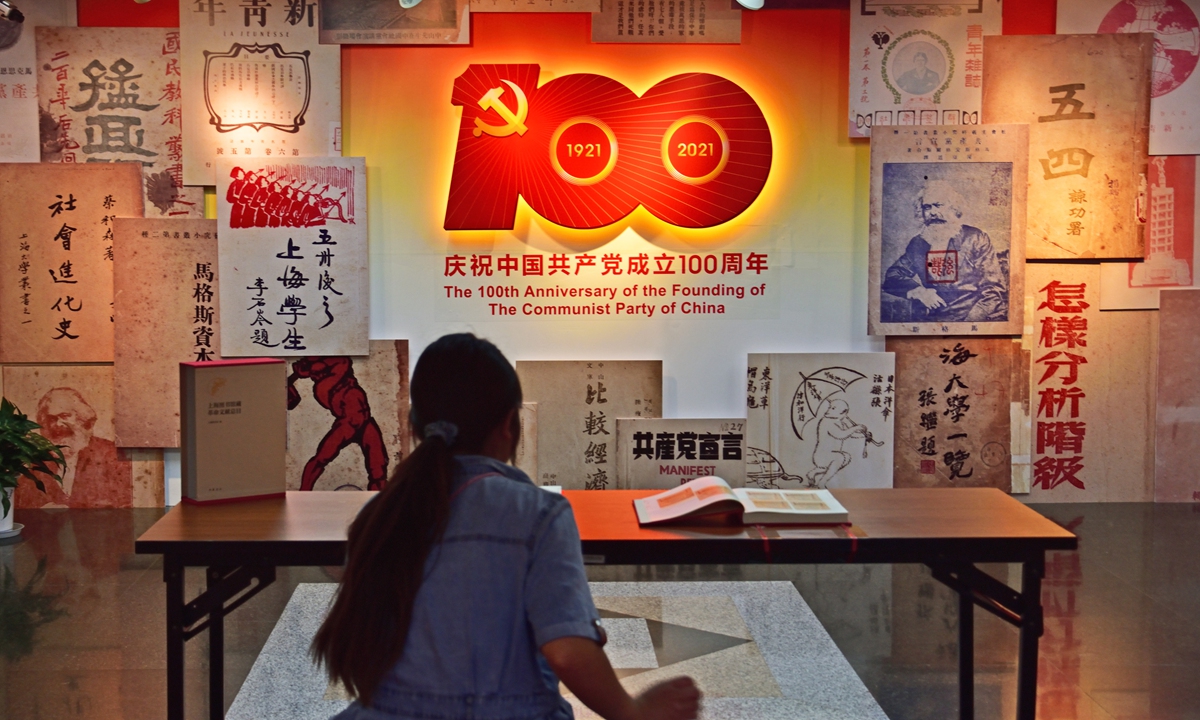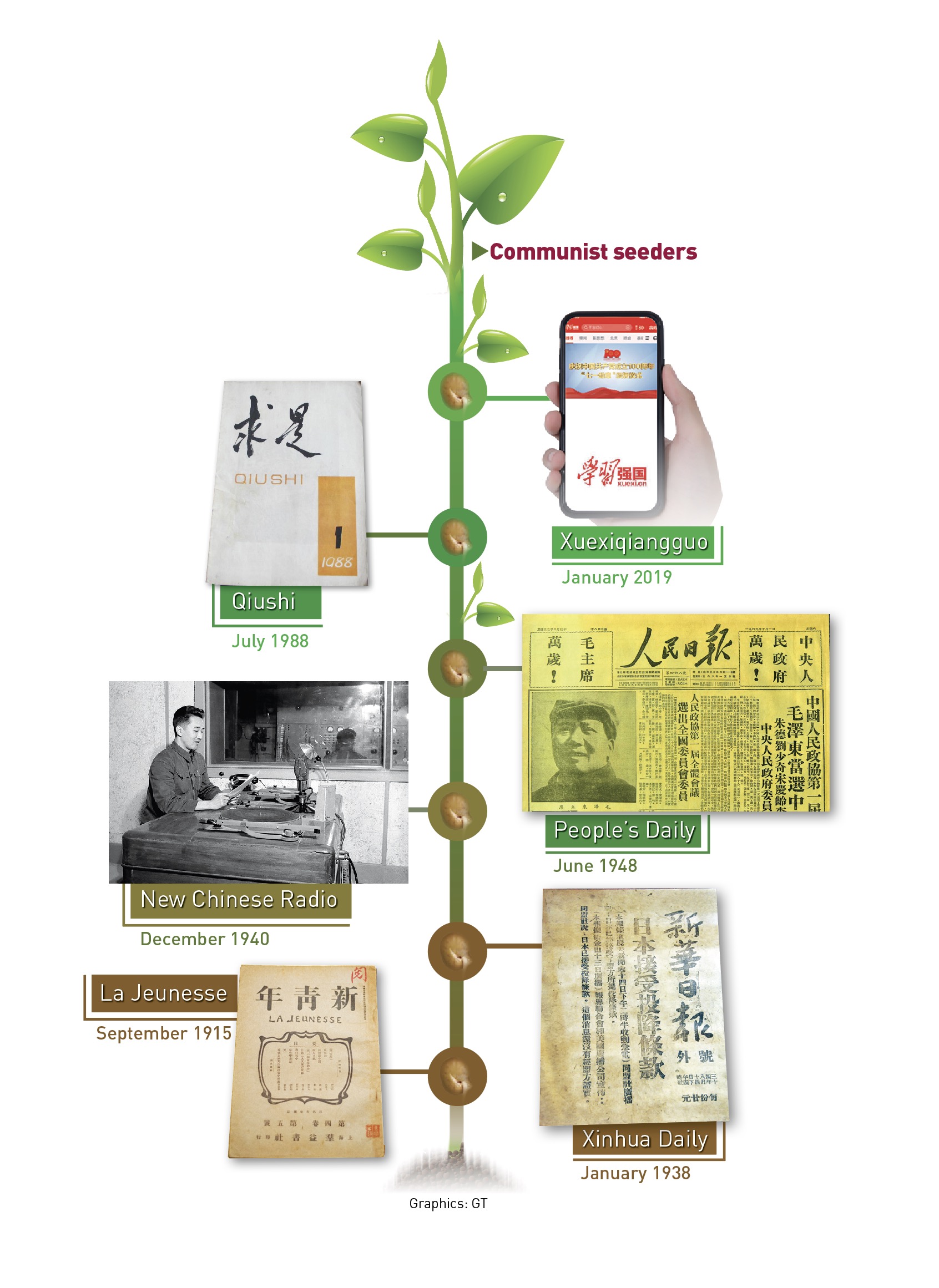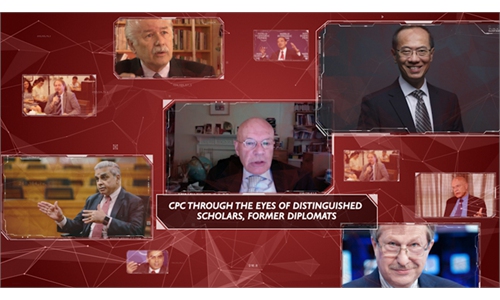
A woman visits an exhibition on CPC history at the Shanghai Library. Photo: VCG
Editor's Note:
Like a seed-planting machine sowing the ideals of Communism in the fertile Chinese soil, the Communist Party of China (CPC) has been making use of the latest and most effective means to make its spirit known to the people, especially among the young. In the early 20th century before the CPC's founding, the magazine New Youth, or La Jeunesse, initiated the New Culture Movement, paving the way for the spread of Marxism in Chinese society. During revolutionary times, the CPC launched newspapers such as the Xinhua Daily, which greatly inspired people suffering from dictatorships and a foreign invasion to change the country. The Party's first "voice" in radio was broadcast from a cave dwelling in Yan'an and it later established television stations after the founding the People's Republic of China, keeping up with the latest communications means as technology advanced. In the 5G internet era of today, the Party is utilizing a variety of new media channels to connect with society, allowing the ideas of the Central Committee to reach grassroots Party members and the masses in real time.

Graphic: GT
Organizing online study
In the past, Party members were accustomed to attending meetings to study Party theory and thought together, but today there are many more convenient ways for members to further their education at any time and place.
Xuexiqiangguo, a widely used Party theory learning app developed by the Publicity Department of the CPC Central Committee, began releasing additional features in late January 2020 with the aim of providing users with a higher-quality distance learning experience since many people were confined to home due to the COVID-19 outbreak.
The app, connected to the website xuexi.cn, is "beyond my expectations as a channel introducing Party thought," says a Beijing university student surnamed Zhang.
Every day, 60 to 70 news articles from major media outlets can be found on the app's front page. The app also automatically captures news from local media websites, a person close to the operation team told the Global Times.
"The app pushes messages every morning and it has introduced a traditional Chinese poetry lecture series to me, which is really, really fascinating," Zhang told the Global Times.
Amid the CPC's centennial, Liu Jianran, a 30-year-old civil servant living in Tianjin, told the Global Times that she also watched a livestream on the app that was answering questions about the history of the CPC.
"The team of the app is really trying fresh ways in telling the Party's history," Liu said.
Teaching history in fun ways
Live-action role-playing (LARP) games, one of the most popular types of entertainment choices among Chinese Gen Zs, have become an emerging channel to popularize CPC history and thought. Many scripts adapted from classic revolutionary stories have been hailed by young Chinese.
At East China University of Political Science and Law (ECUPL), young fans of the genre spent months creating a LARP game based on a real event in CPC history: The convening of the first national congress in 1921. The congress initially convened in Shanghai but, after French police in Shanghai raided the venue, it was forced to conclude on a boat on a lake in Jiaxing, East China's Zhejiang Province.
The main goal of the game is to find the "traitor(s)" hidden among the CPC members who secretly exposed the location of the Shanghai venue to the enemy, an ECUPL administrative staffer surnamed Zhang told the Global Times.
During the game, participants dress in the old-fashioned clothing of the period and act out various roles to learn, in an immersive way, about the difficulties and hardships CPC pioneers experienced while founding the Party.
Putting theories into practice
For today's young CPC members and officials, Party thought and theory must not just be studied, it must also be put into practice. Taking this as a foundation, these young Chinese have come up with new innovative projects adapted to local conditions and the trends of today.
To fight poverty in Xiaru village, Sichuan Province, 29-year-old Ren Min, its Party chief, carried out an investigative survey of local products. Finding that the village was rich in dandelions, she organized villagers to produce and sell dandelion tea.
"I concluded that you don't always need to implement huge projects for poverty alleviation. Like in our village, something as simple as selling dandelion tea and local handicrafts have helped increase villager income," Ren told the Global Times.
She also turned to social media platforms, connecting with well-known writer Sang Gege on Sina Weibo, who wrote the lyrics for a rap song that promoted the region and the village in order to boost tourism.
Ren's experiences in the village have allowed her to better understand how useful CPC theory could be in practice.
Livestreaming to promote and sell local products and starting a homestay business, Chen Shihui, a 28-year-old deputy secretary in Gexin village, a remote underprivileged area in Southwest China's Sichuan province, is another young official.
"The hardest time for me was during the COVID-19 outbreak in early 2020. I became very worried for local residents when I saw that our agricultural products were just pilling up in a heap," Chen told the Global Times.
During the lockdown, Chen and her colleagues turned to short video platforms to help the village.
"During that period, we told residents not to go out during the day, and at night, I started to get in touch with different e-commerce platforms to solve the problem we had with our slow-moving products."
She organized a livestream in which members of streaming sensation Wei Ya's studio picked lemons in a local orchard.
"One second, that's all it took to sell 12,500 kilograms of lemons. That was the first time that I felt the power of the internet," Chen told the Global Times.
Many young CPC members, like Ren and Chen, have injected new blood and fresh energy into the Party. They follow the Party and grow up along with the Party.





